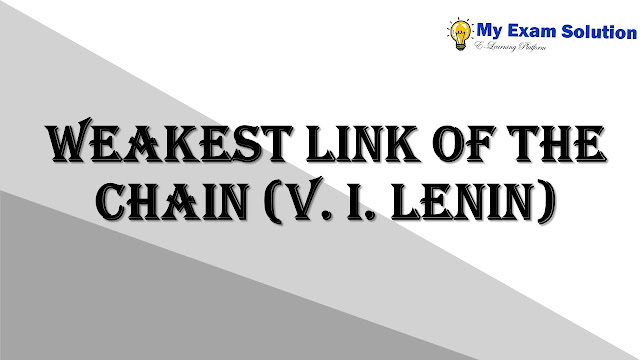Weakest link of the Chain (V. I. Lenin)
Lenin is a controversial political leader who aroused deep
feelings of loyalty among his followers and distrust from his opponents.
Richard Pipes and his Russian co-authors are said to lay ‘bare Lenin the man and
the politician, leaving little doubt that he was a ruthless and manipulative
leader. . .’ (Pipes, 1996: publisher’s blurb).
In Western academia, Neil Harding (1977, 1980) and
Christopher Read (2004) have provided balanced accounts of him, but the general
tone is to consider Lenin as a revolutionary activist rather than a social
theorist (Conquest, 1972; Figes, 1996; Service, 2000). Leszek Kolakowski has
set the tone for contemporary Western interpretations. ‘To Lenin . . . all
theoretical questions were merely instruments of a single aim, the revolution;
and the meaning of all human affairs, ideas, institutions and values resided
exclusively in their bearing in the class struggle. . . . [B]y a natural
progression, the dictatorship first exercised over society, in the name of the
working class and then over the working class, in the name of the party, was
now applied to the party itself, creating the basis for a-man tyranny’
(Kolakowski, 1978, vol. 2: 383, 489).
This evaluation is also shared by some Marxists, notably by
Rosa Luxemburg (1904, 1961). Lenin recognised the importance of the detail of
history and the need to generalise on the basis of empirically verifiable facts
rather than on a priori reasoning. In discussing the nature of warfare, for
example, Lenin points out that ‘Marxist dialectics call for a concrete analysis
of each specific historical situation’ (The Junius Pamphlet (1916), Lenin,
Collected Works (hereafter CW) vol. 22: 316). He was a serious student of
public voting behaviour and strike statistics (The Results of the Elections in
the Worker’s Curia in Petersburg, CW12: 86–7; Strike Statistics in Russia,
CW16: 395; The Historical Meaning of the Inner-Party Struggle in Russia, CW16:
381). He also measured the influence and popularity of parties (Narodniks,
Mensheviks, and Bolsheviks) by a study of the density of their respective
newspaper circulation and from which he was able to estimate the working-class
support for the Narodniks (How Strong is the Left-Narodnik Trend Among the
Workers (28 June 1914), CW: 20).
Habermas’ version of Critical Theory is not the last word on the school of thought, as Lenin and others attest. Cox and Ashley, for instance, present alternatives to discourse ethics. Take Ashley’s work, which challenges dominant theories in International Relations, particularly Neorealism, for its “machine-like, self-enclosed unity (1984, 268).” Bringing Foucault into International Relations (as he also draws on Habermas and Bourdieu, but less so), Ashley advocates for a “genealogical attitude” that is attentive to historical change, how different subjects and interests are produced, and resistance movements that challenge dominant structures (1987, 409– 411). The aim is to deconstruct orthodox discourses and show their fragmentation. Ashley’s version of theory, which seems political and empowering, is confined to the discipline of International Relations. He explicitly rejects such a depiction, noting how “interpretative strategy” is not just about the discipline, but also has “theoretical and practical import (Ashley and Walker 1990, 367).” This consideration of strategy, however, shows little signs of connecting to collective struggles. While hoping to extend beyond the university, action appears firmly connected to it; to propose reading as a strategy for potential liberation (Ashley and Walker 1990, 402), for example, intellectualizes political action and presupposes the comfort of free time and leisure. Moreover, to advocate genealogical projects that reveal that sovereignty is a “problematic construct,” or to use feminine pronouns in one’s writing, remains wedded to the fetishization of civil society that Habermasians also promote. Specifically, to argue that the state is fragmented, and not a natural unity, is contemplative activity that presents little by way of strategic input to movements.







0 comments:
Note: Only a member of this blog may post a comment.